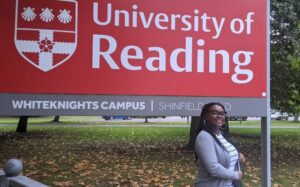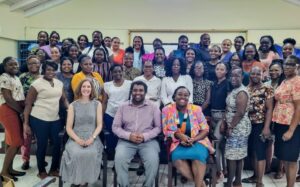“There were no speech and language therapists in the entire country.” Reading graduate, Kimberley Cambridge, shares her mission to build speech and language therapy services from the ground up.
 When Kimberley enrolled for a MSc at the University of Reading to study speech and language therapy, she wasn’t just beginning a new chapter, she was answering a call.
When Kimberley enrolled for a MSc at the University of Reading to study speech and language therapy, she wasn’t just beginning a new chapter, she was answering a call.
After graduating from college, Kimberley had originally set her sights on a career in medicine. However after receiving some unexpected results, she began to consider another path. Kimberley said: “I had done better than I expected in psychology, which made me consider it as a potential career for the first time. Everyone thought that I would go into medicine – I was even granted a scholarship to study medicine – but my mindset had shifted and psychology felt like it was the right choice.”
Following a calling
Kimberley pursued this feeling and went on to study a BSc in Psychology at the University of the West Indies in 2013, which she explained opened the doors to an array of opportunities. She said: “Psychology opened lots of doors for me. When it came to specialising, I received a Fullbright Scholarship to study a MSc at Southern Illinois University of Carbondale where I worked in rehabilitation psychology. I worked with people with a range of disabilities, supporting them to get back into the workplace.
“Helping people came very naturally to me and it felt like I was destined to work with people who had disabilities.”
After completing her master’s degree, Kimberley returned home to St Vincent and the Grenadines. She explained: “I began working as a psychologist. One of the largest groups of people I worked with were young people on the autism spectrum who were having difficulty navigating their emotions and communicating.
“At the time the country did not have a speech and language therapist. As an island of around 100,000 people, we relied on the World Paediatric Group from the United States, who visited the island around once a year to help children who had communication difficulties and disorders.”
In 2017, Kimberley began volunteering with the World Paediatric Group during their annual visit. She said: “I was really engaged with their work, but as you can imagine seeing a child with severe needs once a year isn’t enough, so I set up my own ‘bootleg’ clinic where I would see the children while being guided by the professionals – this way we could help more children.”
After almost four years of volunteering her time, Kimberley decided to take the plunge and train as a Speech and Language Therapist (SpLT). She said: “I wasn’t interested at first as I’d not long finished my master’s, however we still didn’t have a SpLT in the country and there wasn’t anyone stepping up to do the degree, so it felt like the right thing to do.”
A wide-ranging impact
Aided by an anonymous donor, Kimberley enrolled at the University of Reading – which was the travel hub of dreams for an adventurous international student like herself. “I loved being so close to the airport in case I needed to go home and the Reading train station can take you just about everywhere in the UK,” she said.
“A friend and I would often explore Bath, Bristol or even just London and Henley-on-Thames during our breaks from studying. We had so much fun exploring the different cities.”
The course itself offered a close-knit cohort of just 21 students and tutors, who understood the nuances of different cultures and practical opportunities, like placements in the on-campus clinic run by Dr Tom Lucas and the Centre for Autism.
“I was really excited about the placements because it gave me the opportunity to practise under supervision and get real-time feedback. It gave me the confidence to know I could do this,” Kimberley recalled.
Kimberley is currently the only qualified SpLT in her country and continues to juggle a wide variety of responsibilities – from working with stroke patients who are relearning how to speak and swallow, to non-verbal children using Augmentative and Alternative Communication (AAC), to parents trying to understand their child’s needs. She said:
“There’s no luxury of specialising here. If someone has a stroke, it’s me. If a child needs support with communication, again, it’s me.”
From developing swallowing rehabilitation strategies, to introducing eye-gaze technology to help a child with cerebral palsy communication – the range of Kimberley’s work is staggering. And with no occupational therapists or behavioural therapists for children on the spectrum in the Ministry of Health on the island either, she at times finds herself doing those roles too.
Building capacity through education
Kimberley is determined not to remain the only SpLT in St Vincent and the Grenadines. In collaboration with her Reading lecturers – Dr Vishnu Nair and Dr Emma Pagnamenta – she recently launched a pioneering project funded through a grant from the University.
 Together, they delivered training sessions in St Vincent and the Grenadines for early years educators, primary teachers and parents, on supporting children with communication needs. The team delivered practical workshops providing tips and tools that parents and teachers alike can use and adapt to support the child’s individual needs.
Together, they delivered training sessions in St Vincent and the Grenadines for early years educators, primary teachers and parents, on supporting children with communication needs. The team delivered practical workshops providing tips and tools that parents and teachers alike can use and adapt to support the child’s individual needs.
Kimberley shared: “The turnout was amazing. The number of teachers who came was beyond our imagination – they were so enthusiastic and had so many questions. Some will even stop my mum when they see her out in the shops to pass along questions to me!”
But some of the most touching moments for Kimberley has been the parental response she has received. She said: “A single dad whose daughter is non-verbal ASD made his own communication board. Now he comes to clinic so proud, showing us how he’s learning to talk to her.
“Sometimes parents will say to me ‘he never used to speak, now I can’t get him to stop!’, and for some parents, just being able to have their child communicate ‘I love you’ for the first time is all they’ve ever wanted. That sort of feedback means everything, it’s what keeps me going.”
In the future, Kimberley is hoping to develop a local training programme that can produce SpLT assistants, who can deliver support within schools and communities under her guidance.
Be open
Turning her thoughts to anyone who is interested in becoming a SpLT, Kimberley’s biggest piece of advice is to be open.
“Don’t be afraid to step into under-resourced communities. Be ready to listen. Embrace the full cultural experience. Go to the Caribbean or South America – places where the real picture is more complex,” she urges. “It will make you a better therapist and a better global citizen.”






